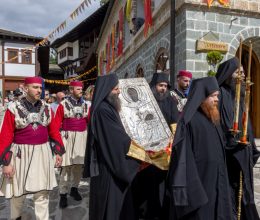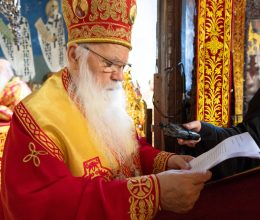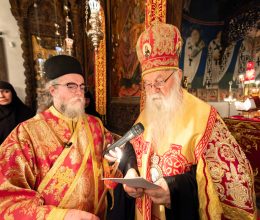History of the Feast

The veneration of St. John has always been one of the most widespread in the Orthodox Church. This is evidenced by the many churches dedicated to him and the numerous reliquaries that contain his honorable relics, scattered across the world. The most visited places are those where St. John was born, where he carried out his ministry, and where his holy head was beheaded.
The commemoration of St. John the Baptist was celebrated intensively from the beginning of the 4th century. The feast of the Beheading of his head (August 29/September 11) began to be observed very early, as we find testimony to this in two homilies on the feast written by Blessed Augustine. A little later, in the 5th century, homilies on this feast were written by Peter Chrysologus, Chrysippus, the priest of Jerusalem, Basil of Seleucia, and later by St. Andrew of Crete and St. Theodore the Studite. In the church hymns and stichera written by St. Andrew of Crete, St. John of Damascus, and St. Germanus, Patriarch of Constantinople, the Church glorifies St. John as the preacher of repentance and the Kingdom of God, the most glorious prophet among all prophets, as he was worthy to baptize the proclaimed Savior. He is also honored as an angel, apostle, and martyr.
Historical accounts tell us that St. John the Baptist was particularly venerated in the Byzantine Empire. There was a tradition that every August 29/September 11, the imperial court would visit the Studion Monastery, dedicated to St. John the Forerunner, to venerate his head, which was kept there. We know that in the 10th and 11th centuries, this precious relic, one of the most revered in Constantinople, was housed in the church of this monastery. In a letter sent by Alexius Comnenus to Robert of Flanders, it is mentioned immediately after the relics of Christ.
On the feast of the Beheading of St. John the Baptist, the Church prescribes a strict fast, requiring abstinence from meat, dairy products, and fish, so that, according to the Typikon, “we may not be accomplices in Herod’s indulgence.” The Typikon informs us that the fast on this feast was likely established at the same time as the feast itself and that it is “an inheritance from the ancient holy fathers.”
The Mysterious Message We Draw from the Person of St. John the Baptist
The Church sees in St. John the Baptist all the heavenly virtues, the virtues of all the Prophets, all the Apostles, all the heavenly Angels, all the Martyrs, and all the Confessors. For the Forerunner was the first to be sent by God to announce the coming of the Savior into the world. He was the first to witness the Holy Spirit descending upon Christ at His baptism; he was the first Evangelist who proclaimed the good news of the nearness of the Kingdom of Heaven; the first preacher who, in Hades, proclaimed Christ’s triumphant descent into the realm of the dead. A true earthly angel and heavenly man, of whom the Lord Himself said that he was not only a prophet but more than a prophet—an angel sent before Him to prepare His way. He was the first martyr and a model for all future martyrs who, as the troparion says, “joyfully suffered for the truth,” knowing that death is merely a gateway leading to eternity. He was also the first confessor of God, who fearlessly looked Herod in the eye, declaring that for the sake of sin, all the laws of heaven and earth stood against him.

The ever-relevant figure and preaching of the greatest among those born of women penetrate deeply into the being of every person, calling them to a noble struggle and mission. St. John, with his thunderous call, echoes through the wilderness of our modern, superficially joyful living, calling all of humanity—meaning all of us—to repentance, to open our hearts to God, to seek greater closeness with Him and with those around us. Each of us is called to such a prophetic, martyrdom, apostolic, and angelic service. Thus, the modern Christian is a person like everyone else, but at the same time, he is also an apostle who glorifies God in every place, on every occasion, and according to his gifts and abilities. The apostolic activity becomes his activity, which he voluntarily adopts because he cannot help but speak of the joy he lives. This joy, which stirs the depths of his being, compels him to go beyond himself in service to others, in service to the truth, and, like St. John and all the apostles, to conquer the world with the good and joyous news of the Kingdom of God and the risen Christ.
Some go out into public spaces and openly proclaim the Divine message of salvation, while others preach with their silence, which speaks volumes. Some challenge and unsettle the prevailing contemporary spirit of the day. Some, by bearing witness to the truth, bow their heads under the enemy’s sword, while others are crowned with invisible martyrdom from within… Yet, always and in every moment, the Christian knows that he is called to live an angelic life: his gaze, his words, and his deeds are witnesses to the Kingdom of God, which already shines within him. He bears the burdens, weaknesses, and sins of humanity up to heaven, while bringing down to earth the smile of the Heavenly Father. He knows that it is not enough to simply preach about Christ, but also to work in His vineyard, from which the fruit worthy of repentance—love for God and sacrifice for one’s neighbor—will grow.















